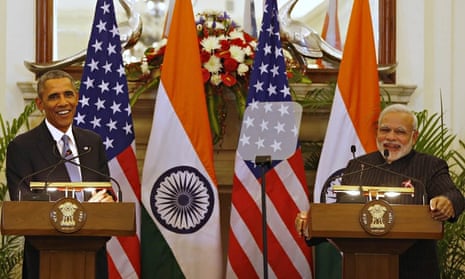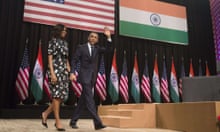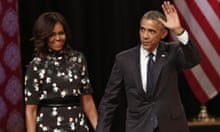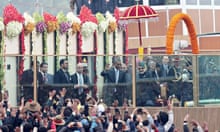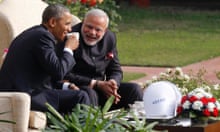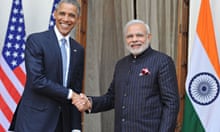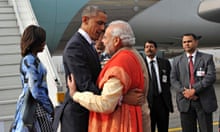US industrial interests took centre-stage at the start of Barack Obama’s visit to India as he and the prime minister, Narendra Modi, outlined a deal to limit the legal liability of US suppliers in the event of a nuclear power plant catastrophe.
Thirty years after an infamous chemical leak killed thousands at Union Carbide’s factory in Bhopal, the threat of tough Indian compensation laws has frustrated US hopes of an export boom in the energy sector – despite an agreement by former US president George W Bush to share civil nuclear technology in 2005.
After pressure from US diplomats, the Indian government was thought to have agreed a state-backed insurance scheme that would cap the exposure of nuclear suppliers and open the door to billions of dollars of new contracts. India will also allow closer tracking of spent fuel to limit the risk of it falling into terrorist hands.
“Today we achieved a breakthrough understanding on two issues that were holding up our civil nuclear cooperation,” Obama said on Sunday.
“The [2005] civil nuclear agreement was the centrepiece of our transformed relationship, which demonstrated new trust and economic opportunities and expanded our option for clean energy,” added Modi.
“In the course of the past four months we have worked with a sense of common purpose to move it forward … I am pleased we have agreed the next stage, consistent with our law and technical and commercial viability.”
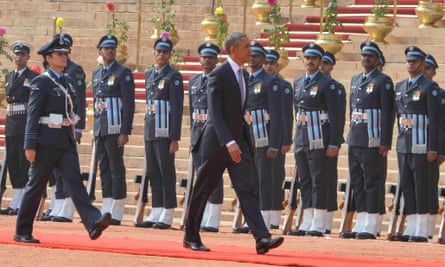
Details of the deal remain vague, however, and officials stressed they were still working out the finer arrangements of the scheme, which is designed to avoid the need to change Indian law.
“We think we came to an understanding of the liability” issue, said the US ambassador to Delhi, Richard Verma, which will operate “through a memorandum of law within the Indian system”.
To fuel its rapidly industrialising economy, India hopes to increase the share of electricity generated from nuclear sources from 4% to 25% by 2050, and the issue has taken on added significance after separate environmental talks failed to agree carbon reduction targets of the sort the US reached with China.
Modi said he supported efforts to tackle climate change, but pointedly refused to accept comparisons with the recent US deal with China, which India views as further ahead in its industrialisation phase.
“We expressed hope for a successful Paris conference on climate change this year,” said the Indian prime minister. “The agreement that has been concluded between the US and China does not impose pressure on us; India is an independent country. But climate change and global warning itself is huge pressure.”
The two leaders trumpeted more limited deals on air pollution and renewable energy that the US president said would help “promote clean energy and confront climate change”. The US said it would share data and tools to help improve air quality.
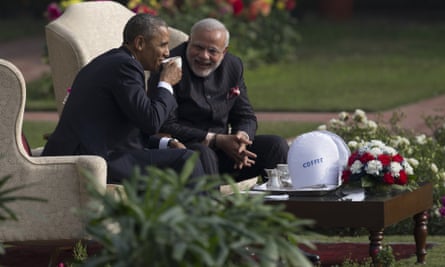
Smog is a growing problem in many Indian cities and was evident as Air Force One arrived earlier on Sunday in Delhi – a city that has also been heavily disrupted by security cordons.
But Obama’s visit, which comes just four months after Modi came to Washington and New York and is his second as president, is seen as a sign of rapidly improving bilateral relations and the two leaders delighted photographers with protracted backslapping on the tarmac.
The trip is timed to coincide with India’s Republic Day on Monday and Obama was afforded full pomp and circumstance as his 49-vehicle motorcade was greeted at the president’s palace by a 21-gun salute and escorts on horseback.
Later, Obama and Modi were seen supping tea during three hours of talks in the cool gardens of Hyderabad House, a state guest facility in the centre of Delhi, before taking brief questions from reporters during a press conference.
Obama said his decision to become the first American president to attend the Republic Day parade reflected his commitment to deepen the US’s relationship with India. “A strong relationship with India is critical to America’s success in the 21st century,” he said.
The two governments also said they had struck deals to share defence technology and improve dialogue in future, with a security hotline between Obama and Modi.
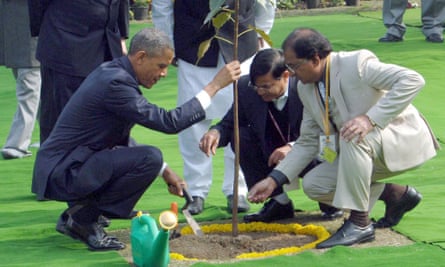
But ahead of the summit, US analysts expected the nuclear deal to be the key “deliverable” of Obama’s visit and negotiators extended preliminary talks in London last week to hammer out final details.
“Nuclear liability remains the cinder in the eye of the relationship right now,” Rick Rossow, of the Centre for Strategic and International Studies (CSIS), said in Washington last week. “Nuclear cooperation was the high-water mark for our bilateral history and the fact that India’s nuclear liability law precludes American involvement, it stings.”
US suggestions of full legal indemnity for suppliers were knocked by the Indian government, which is wary of trying to overturn a 2010 nuclear liability law in parliament.
Instead, US lobbyists and commentators have stressed nuclear power’s role in reducing India’s dependency on coal and other polluting energy sources.
“We’re very cognisant of the fact that India has suffered the worst industrial tragedy [at Bhopal] but at the same time, environmental degradation is another form of industrial tragedy and nuclear is a cleaner source,” added Rossow.
“The family that’s heating their home by using a dung cake and doesn’t have piping, right, they’re slowly killing themselves. So nuclear’s not perfect, but you also have to look at the alternatives.”
